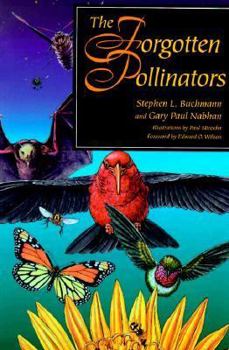The Forgotten Pollinators
Select Format
Select Condition 
Book Overview
Consider this: Without interaction between animals and flowering plants, the seeds and fruits that make up nearly eighty percent of the human diet would not exist. In The Forgotten Pollinators, Stephen L. Buchmann, one of the world's leading authorities on bees and pollination, and Gary Paul Nabhan, award-winning writer and renowned crop ecologist, explore the vital but little-appreciated relationship between plants and the animals they...
Format:Paperback
Language:English
ISBN:1559633530
ISBN13:9781559633536
Release Date:June 1997
Publisher:Island Press
Length:312 Pages
Weight:0.98 lbs.
Dimensions:0.8" x 6.0" x 8.9"
Customer Reviews
5 ratings
The Buds 'n the Bees
Published by Thriftbooks.com User , 15 years ago
Honey bees are less easily forgotten in 2008 than they were in 1997, when this book was published. Any crisis is good press, and several threats to honey bees - sudden hive collapse, viral and other infestations, etc - have put the hives on the front pages lately. A serious decline in the population of commercial pollinators does threaten America's agricultural productivity, especially of orchard crops. Doing something about it will require serious science and public support for serious science, so perhaps all of us ought to learn something about the buds and the bees. The first chapter of The Forgotten Pollinators is titled "Silent Springs and Fruitless Falls: the Impending Pollinator Crisis". Clearly the authors are alarmed about public ignorance or indifference to the role of pollinators in the ecology of Earth today. However, the bulk of their book is not alarmist but informational. They describe in lively detail the physical mechanisms of pollination, the symbiotic interdependencies of diverse plants and their specific pollinators, and a bit of the history of human-related changes in populations of pollinators and thus of plant communities. As the book jacket declares, "plant-pollinator relationships offer vivid examples of the connections between endangered species and threatened habitats." Plant-pollinator relationships also offer remarkable proofs of Darwinian evolutionary theories, as flowers and beaks have co-evolved for adaptive mutual reproductive advantage. The Forgotten Pollinators is solid science but it's also a chatty book, full of personal anecdotes and asides, written in easy-going non-technical prose. It's a book you might read in your study, in a lawn chair on your patio after planting your dahlia tubers, or even at the beach, as I did.
an eye opener
Published by Thriftbooks.com User , 22 years ago
A great book, fun to read. Its a real eye opener - with messages we all need to take with us. We're so dependent on the pollinators yet their work is so transparent to us. This book lays it all out. Its quite timeless in both the message and the great info on different types of insects and animals. You can learn a lot in this book on a lot of different levels
Discovering the facts of life
Published by Thriftbooks.com User , 22 years ago
Reading this book I felt as though my basic education was flawed by my not having been taught the supreme importance of the insect world to all life on earth. Each page presented fascinating, sometimes alarming information, about our natural world that I had never seen, though it is always right in front of me. The most enlightening book I have read in years!
a new Silent Spring
Published by Thriftbooks.com User , 24 years ago
Like Silent Spring, this book surprizes and alarms. It is well written, rarely bogging down, and opens new ways of understanding with almost every chapter - the perils of patchwork preservation, the honeybee as an invading exotic, the concept of nectar corridors for long distance pollinators. Well done indeed.
The world is complex and wonderful, especially reproduction
Published by Thriftbooks.com User , 27 years ago
Ever wonder where most plants come from? They come from seeds. Ever wonder where seeds come from? They come from sex. Ever wonder what plant sex is about (or why this is an issue)? It comes from beetles, bees, butterflies, moths, birds, bats and winged pseudogenitalia in general, whether great or small. Pollination is the key to life on the terrestrial earth. Pollination of plants is also the key to life in much of the aquatic part of our planet, which is about the only omission for which the authors might be faulted. It is a mind-expanding exercise, to be sure, to ask ourselves what would happen if pollinator "X" suddenly disappeared from the scene. Buchmann and Nabhan have taken great care both to inform us that all would not be lost, because pollinator "Y" or "Z" is frequently waiting in the wings. But in many, many cases, pollinator "X" has never been studied and cannot even be named, let alone conserved




